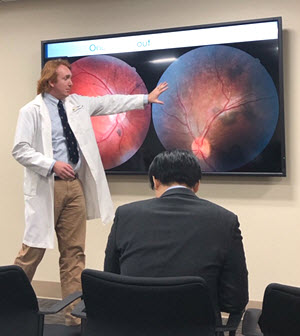

 |
Clerkships
The department of Ophthalmology offers four weeks clerkships for medical students who are interested in ophthalmology or who desire an exposure to ophthalmology as part of their medical education. As part of the month long rotation, students spend time in outpatient clinics, do inpatient consults with residents & faculty, learning basic ophthalmic examination skills and see common ophthalmic diseases. Students are exposed to all sub specialties including pediatric ophthalmology, cornea and anterior segment services, glaucoma and retina services. Medical students interested in doing a clinical rotation, should contact Donna Hemmings at 914-
Residency Program
The New York Medical College offers a 3 year ACGME fully accredited program providing comprehensive training in the New York area. The residents rotate through the two sites, Westchester Medical Center and the NY Health/ Metropolitan Hospital through the 3 years of residency.
Westchester Medical Center (WMC)
The principal hospital is the Westchester Medical Center and Maria Fareri Children’s Hospital which is a tertiary care facility with a level 1 Trauma Center and Burn Center. This hospital serves 3.5 million residents of the Mid-Hudson Valley which includes Westchester County and the surrounding area into Connecticut and Pennsylvania. With the New York medical school campus adjacent, the residents have ample opportunities to work with basic science professors to work on research projects. The residents get to work with core faculty at the Westchester Medical Center in both outpatient setting and daily inpatient consult rounds.
NY Health/Metropolitan
Metropolitan Hospital, the second center, is a community hospital serves a large indigent population and provides culturally-sensitive cares for a large number of the patients in the New York City boroughs. The residents get supervised training by faculty well known in their sub specialties during the rotation.
Clinical Rotations
During the first year, ophthalmology residents spend 8 months at Westchester Medical Center seeing patients in outpatient clinics as well as doing inpatient consults. The primary emphasis is on comprehensive ophthalmology but there is significant exposure to the subspecialty clinics such as cornea, glaucoma, uveitis, oculoplastics, neuro-ophthalmology and retina. At Metropolitan Hospital, residents spend time in the comprehensive and specialty ophthalmology clinics. First year residents perform minor surgical procedures (such as chalazia, eyelid lesion excisions) in the clinics and get to perform ocular surface procedures such as pterygium and serve as first assistant in more complex cases in the operating room 3-4 days a month. In addition to this the first year residents get to perform anterior segment and retinal lasers along with intraocular injections in the clinic. The exposure the residents have in their first year allows them to become comfortable with performing intraocular surgical procedures as early as their second year.
Residents spend 8 months of their second year at Westchester Medical Center in the specialty clinics- Retina, Pediatric ophthalmology and Oculoplastics continuing to hone their clinical skills in addition to learning newer ophthalmic surgical techniques. They also participate in the operating room 1-2 days a week, focusing on oculoplastics, retina, strabismus as well as a few cataract surgical procedures. At Metropolitan Hospital, residents cover comprehensive as well as specialty clinics and get to start doing retinal procedures.
During the third year, residents rotate through comprehensive ophthalmology rotations at both sites spending equal time at both locations. They will focus on more intraocular procedures including cataract, glaucoma and corneal procedures. As third years, residents spend 1-2 days in the operating room and see a higher volume of patients in the outpatient clinics with higher autonomy simulating an independent practicing physician. During this year, the residents also get time to spend time in private office setting observing and learning skills about how to run an outpatient private office efficiently as well as assisting in more complex challenging cases. Third year residents also get the opportunity to be chief residents and improve on their leadership & administrative skills.
On Call
The first year residents take primary call responsibility every fourth day with one weekend typically in a month, covering both hospitals. This gives them the most experience in triaging and dealing with ocular emergencies. During the first 2 weeks, the first years take “buddy call” with the second years. The first year resident will always have a senior resident and attending accessible for help if they feel overwhelmed. Call can be taken from home with the second year and third year sharing the back up Calls. This unique feature allows the second years to obtain surgical experience dealing with ocular emergencies very early in their training. There is an on call attending for general ophthalmology, oculoplastics, and retina at all times
The work day begins at 8 am and generally till the end of the day around 5 pm, until all clinic, OR or consults are done. Duty hours are limited to 80 hours per week, averaged over a 4 week period.